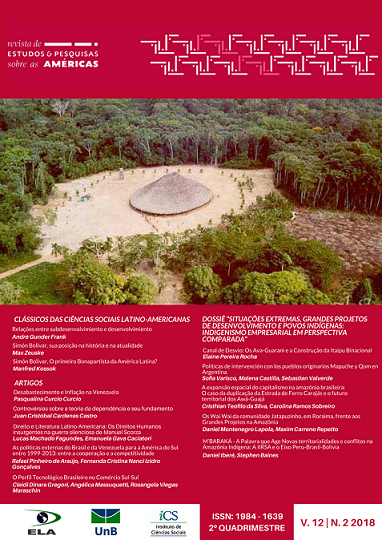M’BARAKÁ - A Palavra que Age Novas territorialidades e conflitos na Amazônia Indígena: A IIRSA e o Eixo Peru-Brasil-Bolívia
Abstract
Este trabalho pretende aprofundar estudos e análises sobre os efeitos das implementações de grandes projetos “desenvolvimentistas”, alinhavados à s diretrizes da Iniciativa para a Integração da Infraestrutura Regional Sul-Americana (IIRSA) sobre os Povos e Territórios Indígenas na Região Amazônica, principalmente na sub-região vinculada à política do Eixo de Desenvolvimento Peru-Brasil-Bolívia, onde se realizam as obras do Complexo Hidrelétrico do Rio Madeira. As constantes denúncias sobre as ameaças que pairam sobre os indígenas na Amazônia revelam a naturalização da violência e o descaso com que esse tema tem sido tratado pelo governo brasileiro e pelas empresas interessadas nos grandes projetos hidrelétricos. A Palavra M’baraká constitui “o modo de ser” Guarani, em livre tradução, seu significado é A Palavra que Age, seu conteúdo é luta. O que torna possível uma aproximação conceitual ao arcabouço teórico da pesquisa-ação. Como metodologia, abre universos de possibilidades para o aflorar dos desejos mais pungentes, das dores mais sentidas, é já o meio-grito assenhoreando-se dos discursos frequentemente apaixonados, abertos, públicos e vivos. Outra forma de dizer que o conhecimento sobre a realidade pode ser o primeiro passo para transformá-la.
Palavras chave: Povos Indígenas - IIRSA- Eixo Peru-Brasil-Bolívia - Complexo Rio Madeira
M’BARAKÁ - The Word That Acts New Territorialities and Conflicts in Indigenous Amazon: IIRSA and the Peru-Brazil-Bolivia Hub
Abstract
This article aims to broaden studies and analyses on the effects of the implementation of large-scale "developmental" projects, aligned with the guidelines of the Initiative for the Integration of Regional Infrastructure in South America (IIRSA), on Indigenous Peoples and Territories in the Amazon Region, a sub-region linked to the policy of the Peru-Brazil-Bolivia Development Hub, where the construction of the River Madeira Hydroelectric Complex is being carried out. The constant denunciations of the threats to indigenous peoples in the Amazon reveal the naturalization of violence and the neglect with which this issue has been addressed by the Brazilian government and by companies interested in implanting large hydroelectric projects. The Word M'baraká constitutes Guarani "way of being", in a free translation, its meaning is The Word that Acts, its content is the struggle. This makes possible a conceptual approach to the theoretical framework of action research. As a methodology, it opens up universes of possibilities for the emergence of the most poignant desires, the most deeply felt suffering, and it is already the half-cry taking over the frequently passionate, open, public and living discourses. Another way of saying that knowledge about reality may be the first step toward transforming it
Key-words: Indigenous Peoples ”“ IIRSA-Peru-Brazil-Bolivia Hub ”“ River Madeira Complex
M’BARAKÁ - La Palabra que Actúa Nuevas territorialidades y conflictos en la Amazonia Indígena: La IIRSA y el Eje Perú-Brasil-Bolivia
Resumen
Este trabajo pretende profundizar estudios y análisis sobre los efectos de las implementaciones de grandes proyectos "desarrollistas", alineados a las directrices de la Iniciativa para la Integración de la Infraestructura Regional Suramericana (IIRSA) sobre los Pueblos y Territorios Indígenas en la Región Amazónica, principalmente en la sub- región vinculada a la política del Eje de Desarrollo Perú-Brasil-Bolivia, donde se realizan las obras del Complejo Hidroeléctrico del Río Madeira. Las constantes denuncias sobre las amenazas que rodean a los indígenas en la Amazonia revelan la naturalización de la violencia y el descuido con que ese tema ha sido tratado por el gobierno brasileño y por las empresas interesadas en los grandes proyectos hidroeléctricos. La Palabra M'baraká constituye "el modo de ser" Guaraní, en libre traducción, su significado es La Palabra que Actúa, su contenido es lucha. Lo que hace posible una aproximación conceptual al marco teórico de la investigación-acción. Como metodología, abre universos de posibilidades para el afloramiento de los deseos más punzantes, de los dolores más sentidas, es ya el medio grito asomándose de los discursos frecuentemente apasionados, abiertos, públicos y vivos. Otra forma de decir que el conocimiento sobre la realidad puede ser el primer paso para transformarla.
Palabras clave: Pueblos Indígenas - IIRSA- Eje Perú-Brasil-Bolivia - Complejo Río Madeira
Downloads
Published
Issue
Section
License
The published material is the property of the Journal, and may be reproduced in whole or in part with indication of the source.
Copyright: Authors will be responsible for obtaining the copyright of the material used. Authors who publish in this journal agree to the following terms:
a)Authors retain the copyright and grant the journal the right of first publication, with the work simultaneously licensed under
the Creative Commons Attribution License which allows the sharing of work with acknowledgment of authorship and initial publication in this journal.
b) Authors are authorized to take additional contracts separately, for non-exclusive distribution of the version of the work published in this journal (eg, publish in institutional repository or as a book chapter), with acknowledgment of authorship and initial publication in this journal.
c) Authors are allowed and encouraged to publish and distribute their work online (eg in institutional repositories or on their personal page) at any point before or during the editorial process, as this can generate productive changes as well as increase the impact and the citation of the published work (See The Effect of Free Access).
















